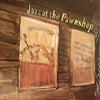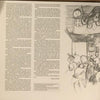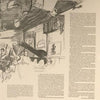







Jazz at the Pawnshop (2LP)
Arne Domnerus, alto sax, clarinet
Bengt Hallberg, piano
Georg Riedel, bass
Egil Johansen, drums
Lars Erstrand, vibraphone (A1-3, C1-3)
2 LP, Gatefold jacket
Original analog Master tape : YES
Heavy Press : 180g
Record color : Black
Speed : 33 RPM
Size : 12'’
Stereo
Live
Record Press : Grammoplast (Sweden)
Label : Proprius
Original Label : Proprius
Recorded at Stampen jazzclub in Stockholm on December 14-15, 1976
Recorded by Gert Palmcrantz
Produced by Jacob Boëthius
Originally released in 1977
Reissued in 2016
Tracks:
Side A :
- Limehouse Blues
- I'm Confessin'
- High Life
Side B :
- Struttin' With Some Barbeque
- Jeep's Blues
- Stuffy
Side C :
- Lady Be Good
- Here Is That Rainy Day
- Barbados
Side D :
- How High The Moon
- Take Five
- Everything Happens To Me
Awards:
TAS Super LP List! Special Merit: Informal
Stereophile Records to Die For - 2012 : "The Best Jazz Recording of the Century!"
Reviews:
“Here’s the thing: If you who are reading this consider yourself an audiophile but you don’t own some version of Jazz at the Pawnshop, trust me, you’re not really an audiophile. It’s been around now in various formats for some four decades, so you’ve had plenty of chance to hear and obtain it. The recording has developed something of a cult following among those in the know, and for good reason. (…)
So, what’s the fuss all about? Jazz at the Pawnshop is some pretty good jazz in some pretty astounding sound. The album’s producer and engineer visited one of Sweden’s most-celebrated jazz venues, the Stampen (or The Pawnshop because of a pawnshop that used to be there), and found its acoustics ideal for recording. Then they set up their equipment to record live several of Sweden’s most-celebrated jazz musicians, a quintet that included Arne Dominerus, alto sax and clarinet; Bengt Hallberg, piano; Larss Erstrand, vibes; Georg Riedel, bass; and Egil Johansen, drums. After two evenings of recording, they came out with tapes of some of the best and most realistic-sounding jazz that anyone had ever heard. The subsequent LP and CD releases took off among audiophiles eager to demonstrate just how accurate their stereo equipment was when playing back music that live would have been largely unamplified.
(…) The numbers run high to jazz standards, starting with Philip Braham’s “Limehouse Blues.” The quintet play well together, with Dominerus’s sax tending to dominate the ensemble but with plenty of room for the other members to shine and solo as well. Because it’s live, in the background we hear quite a lot of room noise, the clinking of glasses, shuffling of feet, occasional applause, audience comments, and conversation. One goes into Jazz at the Pawnshop for the music, certainly, but also for the vivid sound, which involves experiencing the ambience of the small club itself.
And so it goes throughout the eighteen selections, like the traditional “High Life,” Louis Armstrong’s “Struttin’ with Some Barbeque,” Johnny Hodges’s “Jeep’s Blues,” George Gershwin’s “Lady Be Good,” Charlie Parker’s “Barbados,” Morgan Lewis’s “How High the Moon,” Matt Dennis’s “Everything Happens to Me,” Harold Arlen’s “Over the Rainbow,” Charlie Parker’s “Now’s the Time,” Duke Ellington’s “In a Mellow Mood,” Bill Strayhorn’s “Take the ‘A’ Train,” and Harry Warren’s “Jeepers Creepers,” among others. (…)
Producer Jacob Boethius and recording engineer Gert Palmcrantz made the album on location at the Stampen (Pawnshop) Jazz Club in Stockholm, Sweden in December of 1976. The club’s excellent acoustics and the simplicity of the miking probably led to the results that have been pleasing audiophiles all these years: Neumann U47, KM56, and M49 microphones, two Dolby A361 noise-reductions units, two Nagra IV recorders, a Studer mixing board, and two old Ampex loudspeakers with built-in amplifiers. Remarkable, given that sonically this antique array puts most of today’s state-of-the-art digital equipment to shame.” John J. Puccio, Classical Candor
Ratings :
AllMusic : 4 / 5 , Discogs : 4,54 / 5




